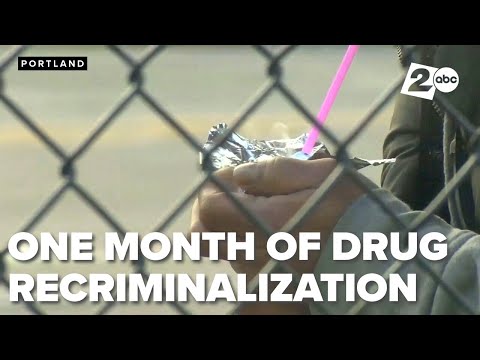Oregon deflection data will show how many people can’t access drug treatment
4 min read
It’s been one month since Oregon’s new drug possession charge took affect and since most counties have been operating a deflection program.
The state has devised a data tracking system to measure the success of these programs. It includes tracking of how lacking treatment beds have affected the programs’ success.
The programs, meant to deflect people away from the criminal justice system and into services, are structured differently depending on the county with a handful of counties opting out of deflection altogether.
Some counties’ deflection programs will begin later in the year.
All counties with a deflection program have one thing in common, they all received state funds and in exchanged have agreed to report data back to the Criminal Justice Commission (CJC). The data will be used by lawmakers to understand deflection best practices and lawmakers will consider the information when deciding if and how to continue funding deflection programs in the future.
CJC has contracted with OHSU to devise a set of questions it will ask counties to respond to in order to track data about deflection success.
The questioners apply to each step of the deflection process for example counties and their service providers are asked to respond to a questionnaire when screening an individual in deflection for services.
The screening questionnaire asks what types of screenings were done, where the screening was done, and by whom, it asks deflection providers to identify whether a substance use disorder was identified, how it has been identified and what substance is being used.
The next questionnaire in the process is filled out when deflection clients are given a referral to services. The questioner asks what types of services the client was referred to and asks why the client did not receive medically managed inpatient treatment. The response options to that question are as follows:
Service not available in their area
Waitlist was too long
Declined service
CCO refused coverage
Change to treatment plan
No longer needed
Lost to follow up/unable to contact
Tony Vezina, Co-Founder of 4D Recovery, one of the three nonprofits currently managing deflection in Multnomah Co, says a lack of treatment bed availability is one of the biggest obstacles the program faces.
"Let’s say I was selling you a car, and I had sold you on this car, and it was like the best car at the best price," he said. "You’re like, "I’m ready to do it right now" and then I was like, "Well, you know what? We can maybe get you the car next week, the likelihood, you’re gonna buy that car is diminished."
He said when beds are not immediately available it becomes much more difficult to get people to engage at a later date.
"Just tracking people down and finding them later on where they’re at, if they ain’t got a phone, if they ain’t answering their emails, where do we go, how do we find people," he said noting that in those situations more often then not they end up having to mark response number seven.
The CJC’s data collection system launched Tuesday however data submitted by counties is preliminary and will not yet indicate whether deflection in many of the cases was successful. Many counties, including Multnomah, are giving people at least a month to engage with services before determining whether their deflection outcome was successful or unsuccessful.
Multnomah County says only two out of the 58 people who have entered its deflection program are currently at that 30-day mark. A spokesperson for the county estimated that by the end of October, the county should have a better idea of the percentage of people that have successfully completed deflection as well as some of the primary causes of so-called failure.
Vezina says defining failure in those terms is somewhat limiting because even if people do end up facing charges and even going to jail there are still other opportunities within the criminal justice system for them to engage with drug court.
https://katu.com/news/local/oregon-deflection-data-will-show-how-many-people-cant-access-drug-treatment
_______________
Stay up to date with our social media:
KATU on Facebook: https://www.facebook.com/katunews
KATU on Twitter: https://twitter.com/KATUNews
Subscribe to KATU on YouTube: https://www.youtube.com/channel/UCmDTerxNU_gvCWLkIPkqghA/?sub_confirmation=1
Daily News Playlist: https://www.youtube.com/playlist?list=PLFtHM_AbvnEUkd_YRTlZpGKkbczT5w062
For more information, visit https://katu.com/
Have a news tip? Send it directly to us:
Email us: newstips@katu.com
Call the Newsroom: 503.231.4222
KATU is a OR based station and a ABC Television affiliate owned and operated by Sinclair Broadcast Group. Sinclair Broadcast Group, Inc. is one of the largest and most diversified television broadcasting companies in the country today.
#KATU #Katu2abc #Portland #Oregon #localnews #oregonnews
Author: KATU News
Go to Source
News post in at: October 3, 2024, 3:04 am.
Visit Our Sponsor’s:
News.Science – News Science






